LAW 504 Report: Taxation of Compensation for Patent Infringement
VerifiedAdded on 2023/02/01
|14
|4136
|75
Report
AI Summary
This report examines the tax implications for Our Earth Pty Ltd, an Australian company, following a successful legal action against Coffee Bean Pty Ltd for design patent infringement. The assignment analyzes the tax treatment of the compensation received, which includes damages for patent infringement, lost revenue, and interest. The report discusses whether the compensation should be treated as capital gains or ordinary income, referencing relevant sections of the Income Tax Assessment Act 1997 (ITAA97). It explores the principles of damages assessment, including the quid pro quo principle, and provides a case study of C&F parking company to illustrate the complexities of patent infringement settlements and their tax consequences. The report concludes with a summary of the tax liabilities Our Earth Pty Ltd may face, emphasizing the importance of proper tax planning to avoid potential issues for shareholders. The analysis considers the implications of various compensation components, such as the patent infringement damages and the interest received, in relation to capital and ordinary income tax rules.
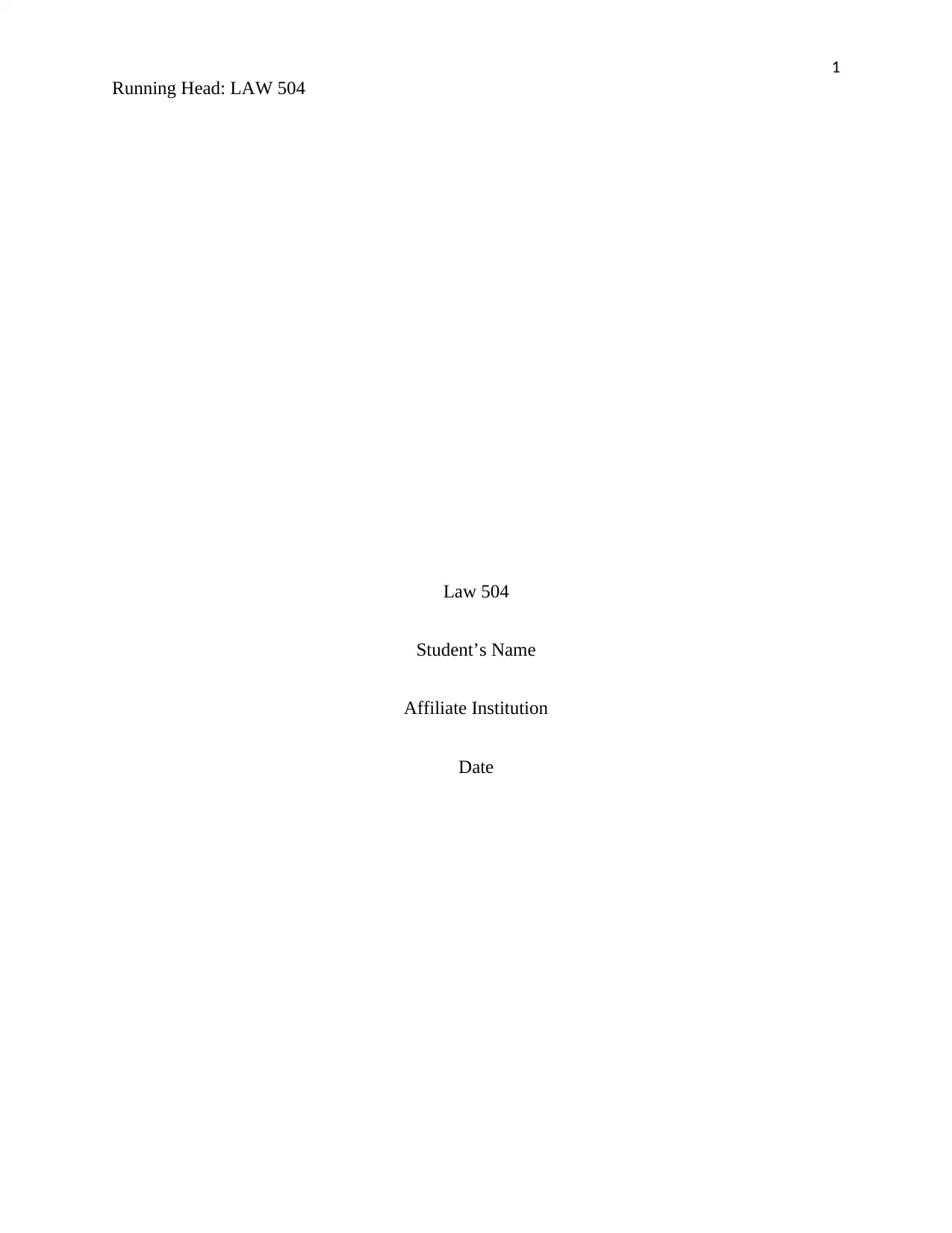
1
Running Head: LAW 504
Law 504
Student’s Name
Affiliate Institution
Date
Running Head: LAW 504
Law 504
Student’s Name
Affiliate Institution
Date
Paraphrase This Document
Need a fresh take? Get an instant paraphrase of this document with our AI Paraphraser
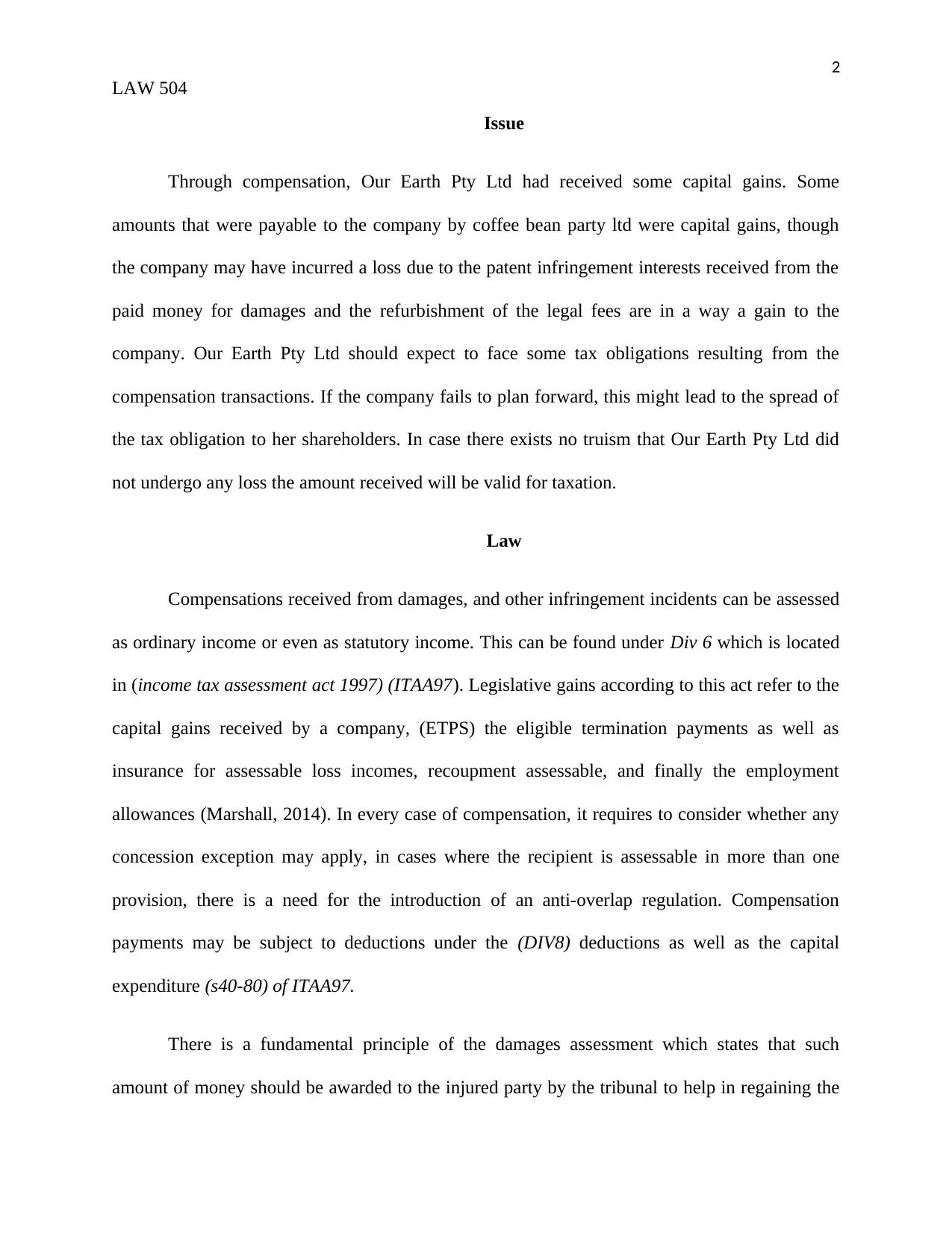
2
LAW 504
Issue
Through compensation, Our Earth Pty Ltd had received some capital gains. Some
amounts that were payable to the company by coffee bean party ltd were capital gains, though
the company may have incurred a loss due to the patent infringement interests received from the
paid money for damages and the refurbishment of the legal fees are in a way a gain to the
company. Our Earth Pty Ltd should expect to face some tax obligations resulting from the
compensation transactions. If the company fails to plan forward, this might lead to the spread of
the tax obligation to her shareholders. In case there exists no truism that Our Earth Pty Ltd did
not undergo any loss the amount received will be valid for taxation.
Law
Compensations received from damages, and other infringement incidents can be assessed
as ordinary income or even as statutory income. This can be found under Div 6 which is located
in (income tax assessment act 1997) (ITAA97). Legislative gains according to this act refer to the
capital gains received by a company, (ETPS) the eligible termination payments as well as
insurance for assessable loss incomes, recoupment assessable, and finally the employment
allowances (Marshall, 2014). In every case of compensation, it requires to consider whether any
concession exception may apply, in cases where the recipient is assessable in more than one
provision, there is a need for the introduction of an anti-overlap regulation. Compensation
payments may be subject to deductions under the (DIV8) deductions as well as the capital
expenditure (s40-80) of ITAA97.
There is a fundamental principle of the damages assessment which states that such
amount of money should be awarded to the injured party by the tribunal to help in regaining the
LAW 504
Issue
Through compensation, Our Earth Pty Ltd had received some capital gains. Some
amounts that were payable to the company by coffee bean party ltd were capital gains, though
the company may have incurred a loss due to the patent infringement interests received from the
paid money for damages and the refurbishment of the legal fees are in a way a gain to the
company. Our Earth Pty Ltd should expect to face some tax obligations resulting from the
compensation transactions. If the company fails to plan forward, this might lead to the spread of
the tax obligation to her shareholders. In case there exists no truism that Our Earth Pty Ltd did
not undergo any loss the amount received will be valid for taxation.
Law
Compensations received from damages, and other infringement incidents can be assessed
as ordinary income or even as statutory income. This can be found under Div 6 which is located
in (income tax assessment act 1997) (ITAA97). Legislative gains according to this act refer to the
capital gains received by a company, (ETPS) the eligible termination payments as well as
insurance for assessable loss incomes, recoupment assessable, and finally the employment
allowances (Marshall, 2014). In every case of compensation, it requires to consider whether any
concession exception may apply, in cases where the recipient is assessable in more than one
provision, there is a need for the introduction of an anti-overlap regulation. Compensation
payments may be subject to deductions under the (DIV8) deductions as well as the capital
expenditure (s40-80) of ITAA97.
There is a fundamental principle of the damages assessment which states that such
amount of money should be awarded to the injured party by the tribunal to help in regaining the
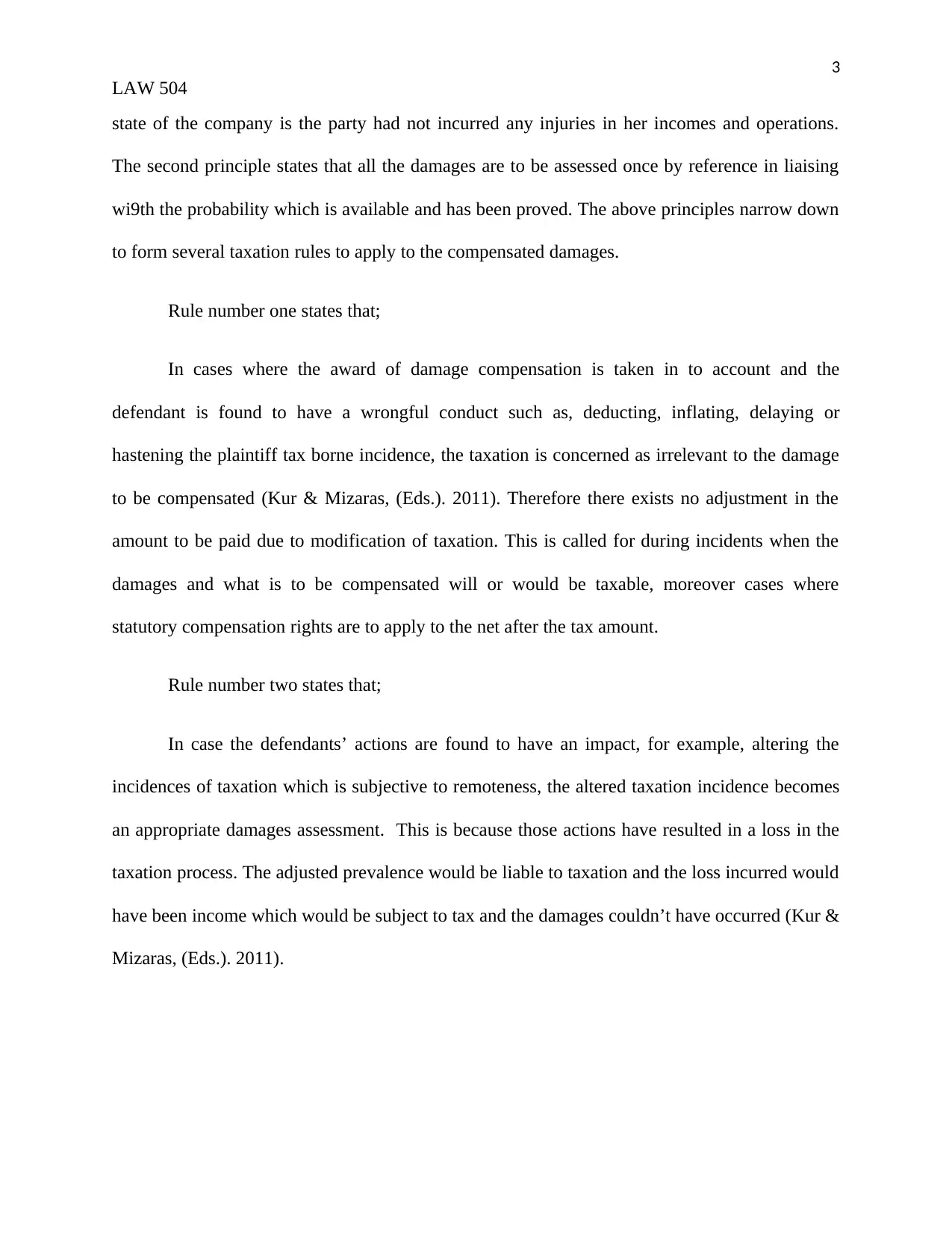
3
LAW 504
state of the company is the party had not incurred any injuries in her incomes and operations.
The second principle states that all the damages are to be assessed once by reference in liaising
wi9th the probability which is available and has been proved. The above principles narrow down
to form several taxation rules to apply to the compensated damages.
Rule number one states that;
In cases where the award of damage compensation is taken in to account and the
defendant is found to have a wrongful conduct such as, deducting, inflating, delaying or
hastening the plaintiff tax borne incidence, the taxation is concerned as irrelevant to the damage
to be compensated (Kur & Mizaras, (Eds.). 2011). Therefore there exists no adjustment in the
amount to be paid due to modification of taxation. This is called for during incidents when the
damages and what is to be compensated will or would be taxable, moreover cases where
statutory compensation rights are to apply to the net after the tax amount.
Rule number two states that;
In case the defendants’ actions are found to have an impact, for example, altering the
incidences of taxation which is subjective to remoteness, the altered taxation incidence becomes
an appropriate damages assessment. This is because those actions have resulted in a loss in the
taxation process. The adjusted prevalence would be liable to taxation and the loss incurred would
have been income which would be subject to tax and the damages couldn’t have occurred (Kur &
Mizaras, (Eds.). 2011).
LAW 504
state of the company is the party had not incurred any injuries in her incomes and operations.
The second principle states that all the damages are to be assessed once by reference in liaising
wi9th the probability which is available and has been proved. The above principles narrow down
to form several taxation rules to apply to the compensated damages.
Rule number one states that;
In cases where the award of damage compensation is taken in to account and the
defendant is found to have a wrongful conduct such as, deducting, inflating, delaying or
hastening the plaintiff tax borne incidence, the taxation is concerned as irrelevant to the damage
to be compensated (Kur & Mizaras, (Eds.). 2011). Therefore there exists no adjustment in the
amount to be paid due to modification of taxation. This is called for during incidents when the
damages and what is to be compensated will or would be taxable, moreover cases where
statutory compensation rights are to apply to the net after the tax amount.
Rule number two states that;
In case the defendants’ actions are found to have an impact, for example, altering the
incidences of taxation which is subjective to remoteness, the altered taxation incidence becomes
an appropriate damages assessment. This is because those actions have resulted in a loss in the
taxation process. The adjusted prevalence would be liable to taxation and the loss incurred would
have been income which would be subject to tax and the damages couldn’t have occurred (Kur &
Mizaras, (Eds.). 2011).
⊘ This is a preview!⊘
Do you want full access?
Subscribe today to unlock all pages.

Trusted by 1+ million students worldwide
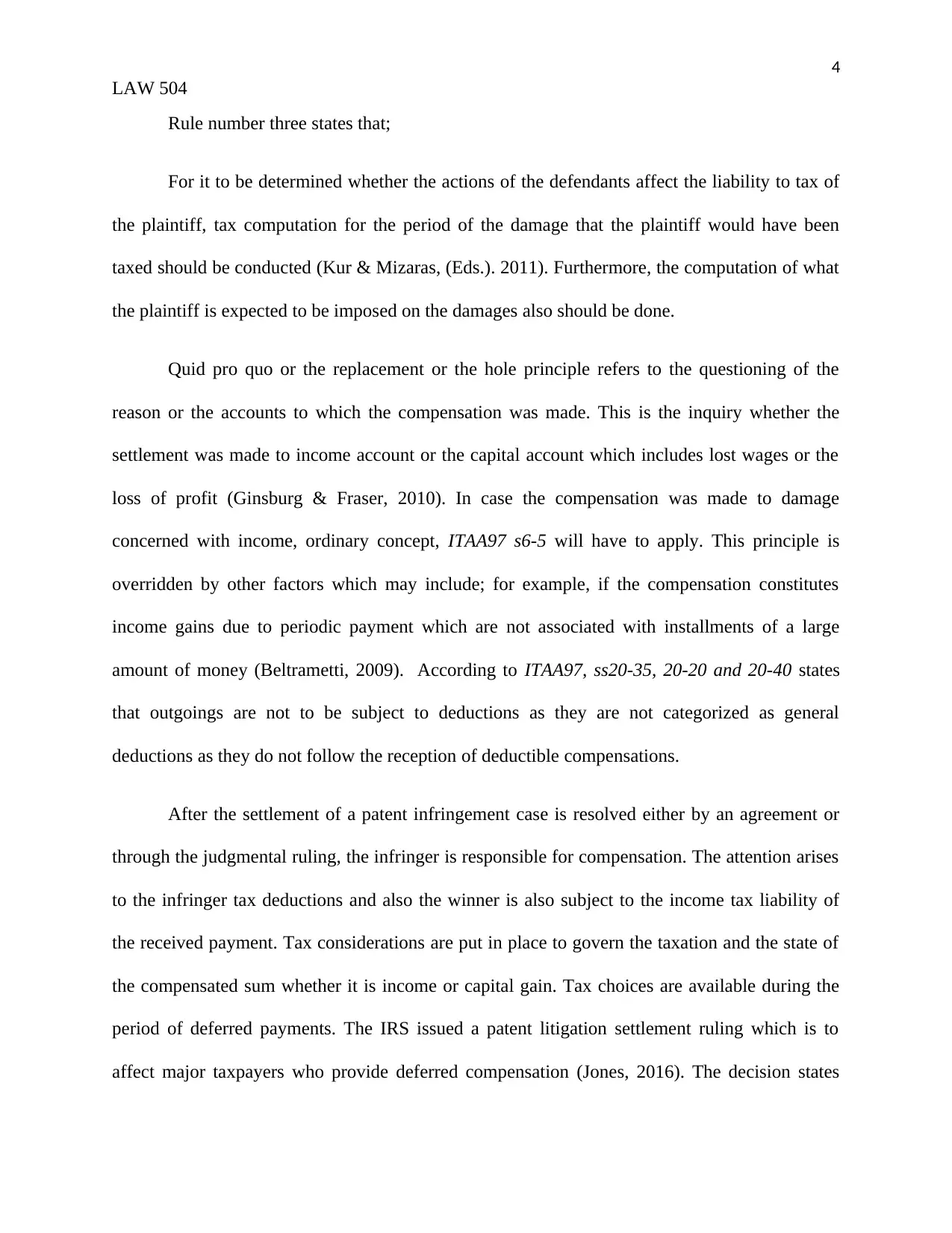
4
LAW 504
Rule number three states that;
For it to be determined whether the actions of the defendants affect the liability to tax of
the plaintiff, tax computation for the period of the damage that the plaintiff would have been
taxed should be conducted (Kur & Mizaras, (Eds.). 2011). Furthermore, the computation of what
the plaintiff is expected to be imposed on the damages also should be done.
Quid pro quo or the replacement or the hole principle refers to the questioning of the
reason or the accounts to which the compensation was made. This is the inquiry whether the
settlement was made to income account or the capital account which includes lost wages or the
loss of profit (Ginsburg & Fraser, 2010). In case the compensation was made to damage
concerned with income, ordinary concept, ITAA97 s6-5 will have to apply. This principle is
overridden by other factors which may include; for example, if the compensation constitutes
income gains due to periodic payment which are not associated with installments of a large
amount of money (Beltrametti, 2009). According to ITAA97, ss20-35, 20-20 and 20-40 states
that outgoings are not to be subject to deductions as they are not categorized as general
deductions as they do not follow the reception of deductible compensations.
After the settlement of a patent infringement case is resolved either by an agreement or
through the judgmental ruling, the infringer is responsible for compensation. The attention arises
to the infringer tax deductions and also the winner is also subject to the income tax liability of
the received payment. Tax considerations are put in place to govern the taxation and the state of
the compensated sum whether it is income or capital gain. Tax choices are available during the
period of deferred payments. The IRS issued a patent litigation settlement ruling which is to
affect major taxpayers who provide deferred compensation (Jones, 2016). The decision states
LAW 504
Rule number three states that;
For it to be determined whether the actions of the defendants affect the liability to tax of
the plaintiff, tax computation for the period of the damage that the plaintiff would have been
taxed should be conducted (Kur & Mizaras, (Eds.). 2011). Furthermore, the computation of what
the plaintiff is expected to be imposed on the damages also should be done.
Quid pro quo or the replacement or the hole principle refers to the questioning of the
reason or the accounts to which the compensation was made. This is the inquiry whether the
settlement was made to income account or the capital account which includes lost wages or the
loss of profit (Ginsburg & Fraser, 2010). In case the compensation was made to damage
concerned with income, ordinary concept, ITAA97 s6-5 will have to apply. This principle is
overridden by other factors which may include; for example, if the compensation constitutes
income gains due to periodic payment which are not associated with installments of a large
amount of money (Beltrametti, 2009). According to ITAA97, ss20-35, 20-20 and 20-40 states
that outgoings are not to be subject to deductions as they are not categorized as general
deductions as they do not follow the reception of deductible compensations.
After the settlement of a patent infringement case is resolved either by an agreement or
through the judgmental ruling, the infringer is responsible for compensation. The attention arises
to the infringer tax deductions and also the winner is also subject to the income tax liability of
the received payment. Tax considerations are put in place to govern the taxation and the state of
the compensated sum whether it is income or capital gain. Tax choices are available during the
period of deferred payments. The IRS issued a patent litigation settlement ruling which is to
affect major taxpayers who provide deferred compensation (Jones, 2016). The decision states
Paraphrase This Document
Need a fresh take? Get an instant paraphrase of this document with our AI Paraphraser
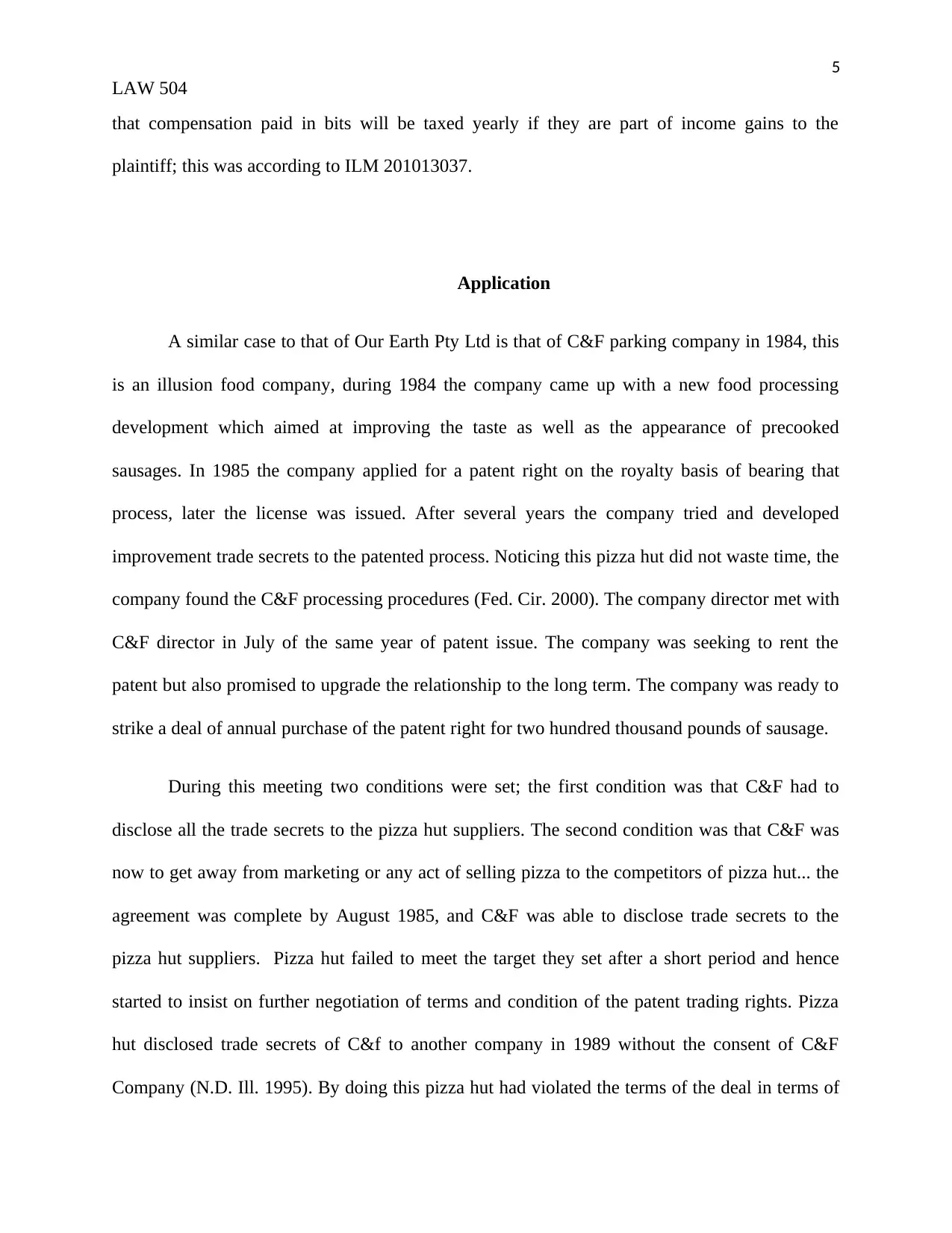
5
LAW 504
that compensation paid in bits will be taxed yearly if they are part of income gains to the
plaintiff; this was according to ILM 201013037.
Application
A similar case to that of Our Earth Pty Ltd is that of C&F parking company in 1984, this
is an illusion food company, during 1984 the company came up with a new food processing
development which aimed at improving the taste as well as the appearance of precooked
sausages. In 1985 the company applied for a patent right on the royalty basis of bearing that
process, later the license was issued. After several years the company tried and developed
improvement trade secrets to the patented process. Noticing this pizza hut did not waste time, the
company found the C&F processing procedures (Fed. Cir. 2000). The company director met with
C&F director in July of the same year of patent issue. The company was seeking to rent the
patent but also promised to upgrade the relationship to the long term. The company was ready to
strike a deal of annual purchase of the patent right for two hundred thousand pounds of sausage.
During this meeting two conditions were set; the first condition was that C&F had to
disclose all the trade secrets to the pizza hut suppliers. The second condition was that C&F was
now to get away from marketing or any act of selling pizza to the competitors of pizza hut... the
agreement was complete by August 1985, and C&F was able to disclose trade secrets to the
pizza hut suppliers. Pizza hut failed to meet the target they set after a short period and hence
started to insist on further negotiation of terms and condition of the patent trading rights. Pizza
hut disclosed trade secrets of C&f to another company in 1989 without the consent of C&F
Company (N.D. Ill. 1995). By doing this pizza hut had violated the terms of the deal in terms of
LAW 504
that compensation paid in bits will be taxed yearly if they are part of income gains to the
plaintiff; this was according to ILM 201013037.
Application
A similar case to that of Our Earth Pty Ltd is that of C&F parking company in 1984, this
is an illusion food company, during 1984 the company came up with a new food processing
development which aimed at improving the taste as well as the appearance of precooked
sausages. In 1985 the company applied for a patent right on the royalty basis of bearing that
process, later the license was issued. After several years the company tried and developed
improvement trade secrets to the patented process. Noticing this pizza hut did not waste time, the
company found the C&F processing procedures (Fed. Cir. 2000). The company director met with
C&F director in July of the same year of patent issue. The company was seeking to rent the
patent but also promised to upgrade the relationship to the long term. The company was ready to
strike a deal of annual purchase of the patent right for two hundred thousand pounds of sausage.
During this meeting two conditions were set; the first condition was that C&F had to
disclose all the trade secrets to the pizza hut suppliers. The second condition was that C&F was
now to get away from marketing or any act of selling pizza to the competitors of pizza hut... the
agreement was complete by August 1985, and C&F was able to disclose trade secrets to the
pizza hut suppliers. Pizza hut failed to meet the target they set after a short period and hence
started to insist on further negotiation of terms and condition of the patent trading rights. Pizza
hut disclosed trade secrets of C&f to another company in 1989 without the consent of C&F
Company (N.D. Ill. 1995). By doing this pizza hut had violated the terms of the deal in terms of
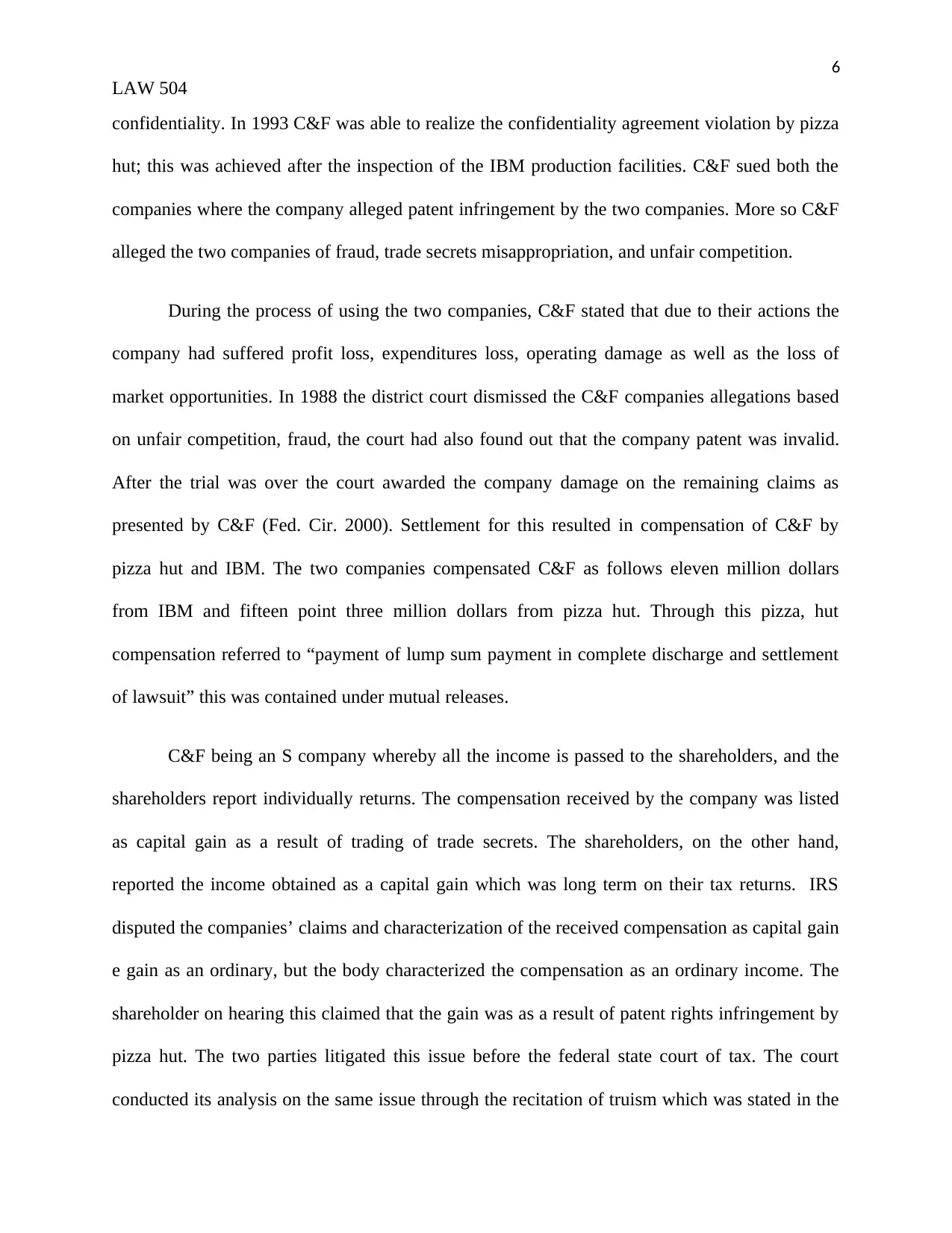
6
LAW 504
confidentiality. In 1993 C&F was able to realize the confidentiality agreement violation by pizza
hut; this was achieved after the inspection of the IBM production facilities. C&F sued both the
companies where the company alleged patent infringement by the two companies. More so C&F
alleged the two companies of fraud, trade secrets misappropriation, and unfair competition.
During the process of using the two companies, C&F stated that due to their actions the
company had suffered profit loss, expenditures loss, operating damage as well as the loss of
market opportunities. In 1988 the district court dismissed the C&F companies allegations based
on unfair competition, fraud, the court had also found out that the company patent was invalid.
After the trial was over the court awarded the company damage on the remaining claims as
presented by C&F (Fed. Cir. 2000). Settlement for this resulted in compensation of C&F by
pizza hut and IBM. The two companies compensated C&F as follows eleven million dollars
from IBM and fifteen point three million dollars from pizza hut. Through this pizza, hut
compensation referred to “payment of lump sum payment in complete discharge and settlement
of lawsuit” this was contained under mutual releases.
C&F being an S company whereby all the income is passed to the shareholders, and the
shareholders report individually returns. The compensation received by the company was listed
as capital gain as a result of trading of trade secrets. The shareholders, on the other hand,
reported the income obtained as a capital gain which was long term on their tax returns. IRS
disputed the companies’ claims and characterization of the received compensation as capital gain
e gain as an ordinary, but the body characterized the compensation as an ordinary income. The
shareholder on hearing this claimed that the gain was as a result of patent rights infringement by
pizza hut. The two parties litigated this issue before the federal state court of tax. The court
conducted its analysis on the same issue through the recitation of truism which was stated in the
LAW 504
confidentiality. In 1993 C&F was able to realize the confidentiality agreement violation by pizza
hut; this was achieved after the inspection of the IBM production facilities. C&F sued both the
companies where the company alleged patent infringement by the two companies. More so C&F
alleged the two companies of fraud, trade secrets misappropriation, and unfair competition.
During the process of using the two companies, C&F stated that due to their actions the
company had suffered profit loss, expenditures loss, operating damage as well as the loss of
market opportunities. In 1988 the district court dismissed the C&F companies allegations based
on unfair competition, fraud, the court had also found out that the company patent was invalid.
After the trial was over the court awarded the company damage on the remaining claims as
presented by C&F (Fed. Cir. 2000). Settlement for this resulted in compensation of C&F by
pizza hut and IBM. The two companies compensated C&F as follows eleven million dollars
from IBM and fifteen point three million dollars from pizza hut. Through this pizza, hut
compensation referred to “payment of lump sum payment in complete discharge and settlement
of lawsuit” this was contained under mutual releases.
C&F being an S company whereby all the income is passed to the shareholders, and the
shareholders report individually returns. The compensation received by the company was listed
as capital gain as a result of trading of trade secrets. The shareholders, on the other hand,
reported the income obtained as a capital gain which was long term on their tax returns. IRS
disputed the companies’ claims and characterization of the received compensation as capital gain
e gain as an ordinary, but the body characterized the compensation as an ordinary income. The
shareholder on hearing this claimed that the gain was as a result of patent rights infringement by
pizza hut. The two parties litigated this issue before the federal state court of tax. The court
conducted its analysis on the same issue through the recitation of truism which was stated in the
⊘ This is a preview!⊘
Do you want full access?
Subscribe today to unlock all pages.

Trusted by 1+ million students worldwide
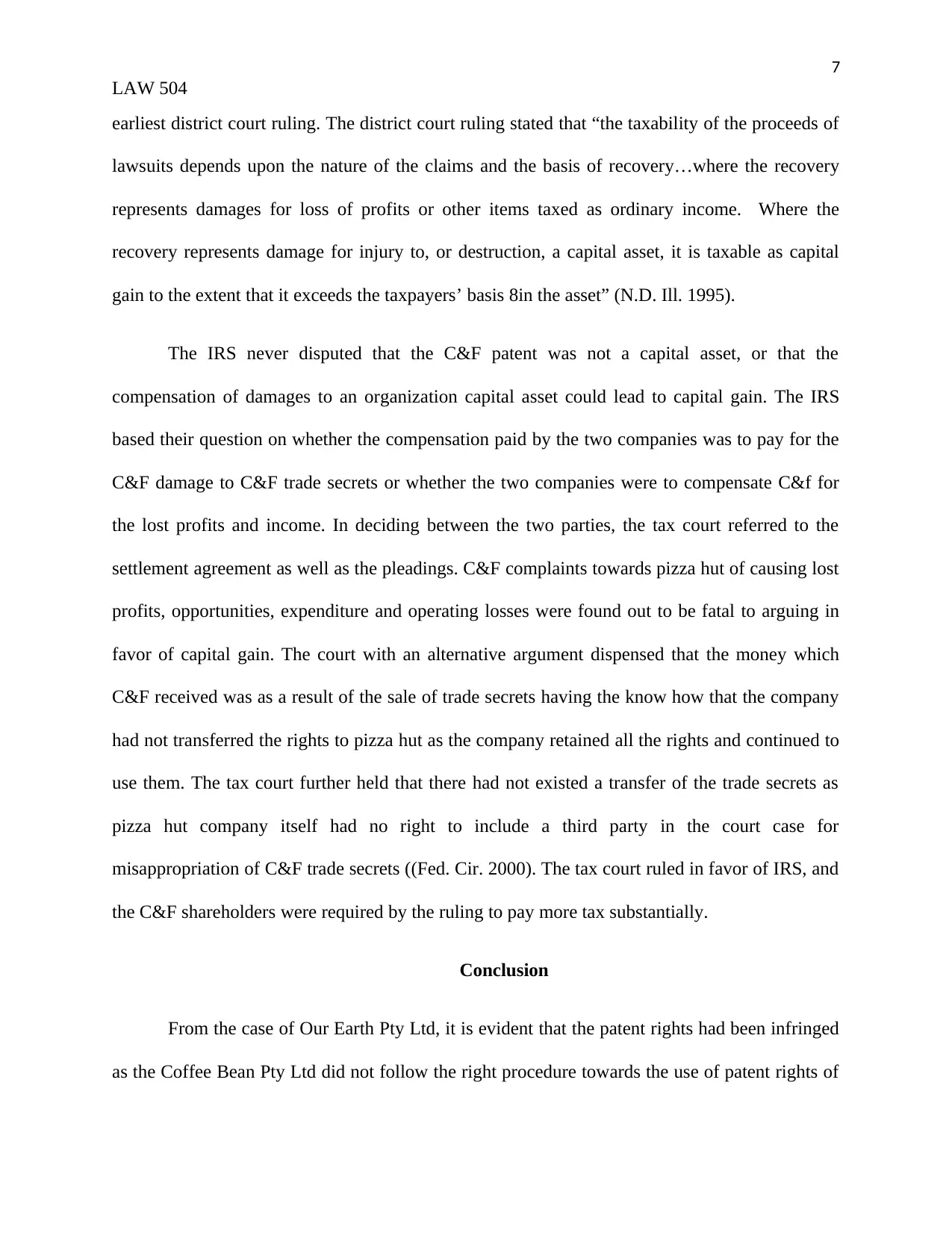
7
LAW 504
earliest district court ruling. The district court ruling stated that “the taxability of the proceeds of
lawsuits depends upon the nature of the claims and the basis of recovery…where the recovery
represents damages for loss of profits or other items taxed as ordinary income. Where the
recovery represents damage for injury to, or destruction, a capital asset, it is taxable as capital
gain to the extent that it exceeds the taxpayers’ basis 8in the asset” (N.D. Ill. 1995).
The IRS never disputed that the C&F patent was not a capital asset, or that the
compensation of damages to an organization capital asset could lead to capital gain. The IRS
based their question on whether the compensation paid by the two companies was to pay for the
C&F damage to C&F trade secrets or whether the two companies were to compensate C&f for
the lost profits and income. In deciding between the two parties, the tax court referred to the
settlement agreement as well as the pleadings. C&F complaints towards pizza hut of causing lost
profits, opportunities, expenditure and operating losses were found out to be fatal to arguing in
favor of capital gain. The court with an alternative argument dispensed that the money which
C&F received was as a result of the sale of trade secrets having the know how that the company
had not transferred the rights to pizza hut as the company retained all the rights and continued to
use them. The tax court further held that there had not existed a transfer of the trade secrets as
pizza hut company itself had no right to include a third party in the court case for
misappropriation of C&F trade secrets ((Fed. Cir. 2000). The tax court ruled in favor of IRS, and
the C&F shareholders were required by the ruling to pay more tax substantially.
Conclusion
From the case of Our Earth Pty Ltd, it is evident that the patent rights had been infringed
as the Coffee Bean Pty Ltd did not follow the right procedure towards the use of patent rights of
LAW 504
earliest district court ruling. The district court ruling stated that “the taxability of the proceeds of
lawsuits depends upon the nature of the claims and the basis of recovery…where the recovery
represents damages for loss of profits or other items taxed as ordinary income. Where the
recovery represents damage for injury to, or destruction, a capital asset, it is taxable as capital
gain to the extent that it exceeds the taxpayers’ basis 8in the asset” (N.D. Ill. 1995).
The IRS never disputed that the C&F patent was not a capital asset, or that the
compensation of damages to an organization capital asset could lead to capital gain. The IRS
based their question on whether the compensation paid by the two companies was to pay for the
C&F damage to C&F trade secrets or whether the two companies were to compensate C&f for
the lost profits and income. In deciding between the two parties, the tax court referred to the
settlement agreement as well as the pleadings. C&F complaints towards pizza hut of causing lost
profits, opportunities, expenditure and operating losses were found out to be fatal to arguing in
favor of capital gain. The court with an alternative argument dispensed that the money which
C&F received was as a result of the sale of trade secrets having the know how that the company
had not transferred the rights to pizza hut as the company retained all the rights and continued to
use them. The tax court further held that there had not existed a transfer of the trade secrets as
pizza hut company itself had no right to include a third party in the court case for
misappropriation of C&F trade secrets ((Fed. Cir. 2000). The tax court ruled in favor of IRS, and
the C&F shareholders were required by the ruling to pay more tax substantially.
Conclusion
From the case of Our Earth Pty Ltd, it is evident that the patent rights had been infringed
as the Coffee Bean Pty Ltd did not follow the right procedure towards the use of patent rights of
Paraphrase This Document
Need a fresh take? Get an instant paraphrase of this document with our AI Paraphraser
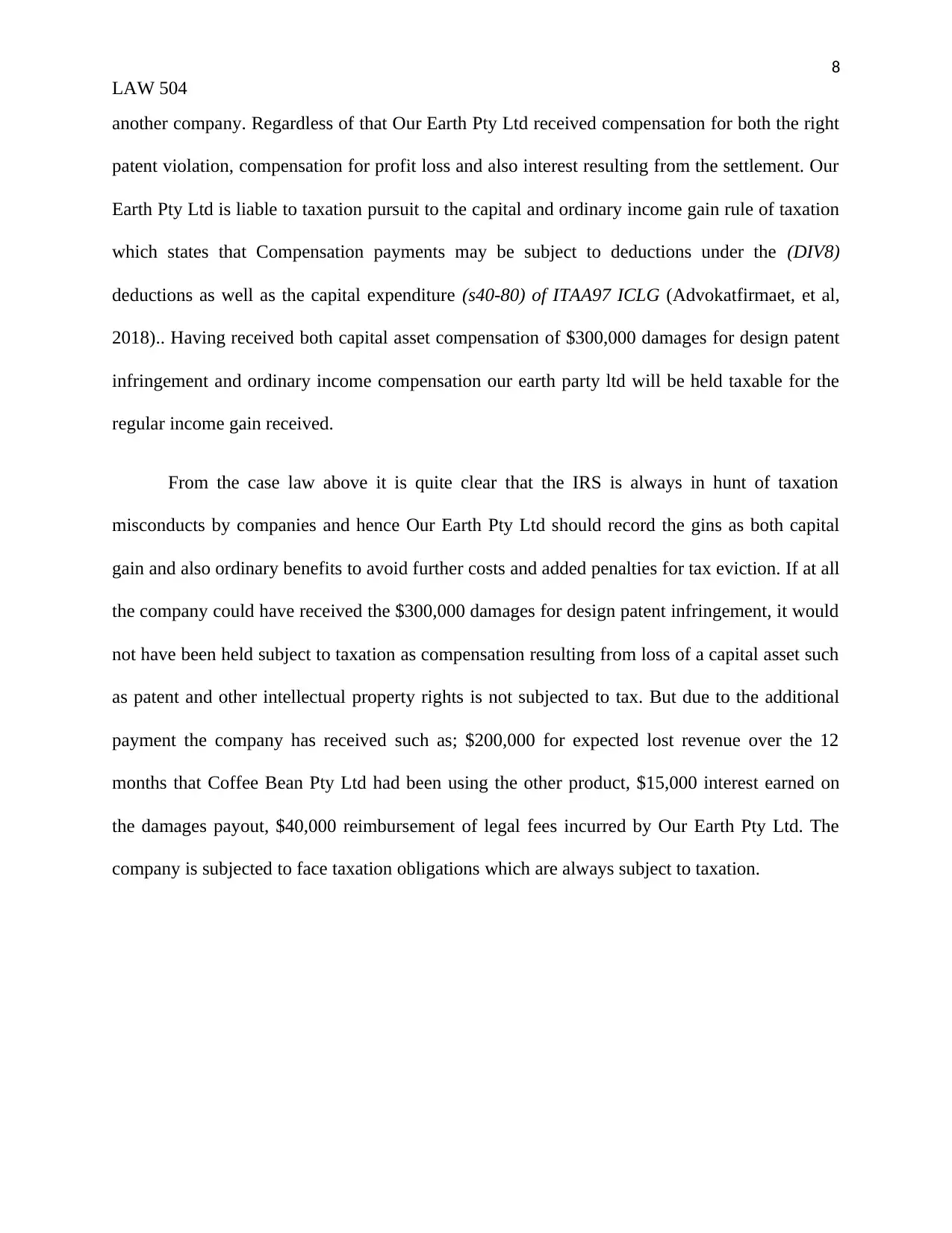
8
LAW 504
another company. Regardless of that Our Earth Pty Ltd received compensation for both the right
patent violation, compensation for profit loss and also interest resulting from the settlement. Our
Earth Pty Ltd is liable to taxation pursuit to the capital and ordinary income gain rule of taxation
which states that Compensation payments may be subject to deductions under the (DIV8)
deductions as well as the capital expenditure (s40-80) of ITAA97 ICLG (Advokatfirmaet, et al,
2018).. Having received both capital asset compensation of $300,000 damages for design patent
infringement and ordinary income compensation our earth party ltd will be held taxable for the
regular income gain received.
From the case law above it is quite clear that the IRS is always in hunt of taxation
misconducts by companies and hence Our Earth Pty Ltd should record the gins as both capital
gain and also ordinary benefits to avoid further costs and added penalties for tax eviction. If at all
the company could have received the $300,000 damages for design patent infringement, it would
not have been held subject to taxation as compensation resulting from loss of a capital asset such
as patent and other intellectual property rights is not subjected to tax. But due to the additional
payment the company has received such as; $200,000 for expected lost revenue over the 12
months that Coffee Bean Pty Ltd had been using the other product, $15,000 interest earned on
the damages payout, $40,000 reimbursement of legal fees incurred by Our Earth Pty Ltd. The
company is subjected to face taxation obligations which are always subject to taxation.
LAW 504
another company. Regardless of that Our Earth Pty Ltd received compensation for both the right
patent violation, compensation for profit loss and also interest resulting from the settlement. Our
Earth Pty Ltd is liable to taxation pursuit to the capital and ordinary income gain rule of taxation
which states that Compensation payments may be subject to deductions under the (DIV8)
deductions as well as the capital expenditure (s40-80) of ITAA97 ICLG (Advokatfirmaet, et al,
2018).. Having received both capital asset compensation of $300,000 damages for design patent
infringement and ordinary income compensation our earth party ltd will be held taxable for the
regular income gain received.
From the case law above it is quite clear that the IRS is always in hunt of taxation
misconducts by companies and hence Our Earth Pty Ltd should record the gins as both capital
gain and also ordinary benefits to avoid further costs and added penalties for tax eviction. If at all
the company could have received the $300,000 damages for design patent infringement, it would
not have been held subject to taxation as compensation resulting from loss of a capital asset such
as patent and other intellectual property rights is not subjected to tax. But due to the additional
payment the company has received such as; $200,000 for expected lost revenue over the 12
months that Coffee Bean Pty Ltd had been using the other product, $15,000 interest earned on
the damages payout, $40,000 reimbursement of legal fees incurred by Our Earth Pty Ltd. The
company is subjected to face taxation obligations which are always subject to taxation.
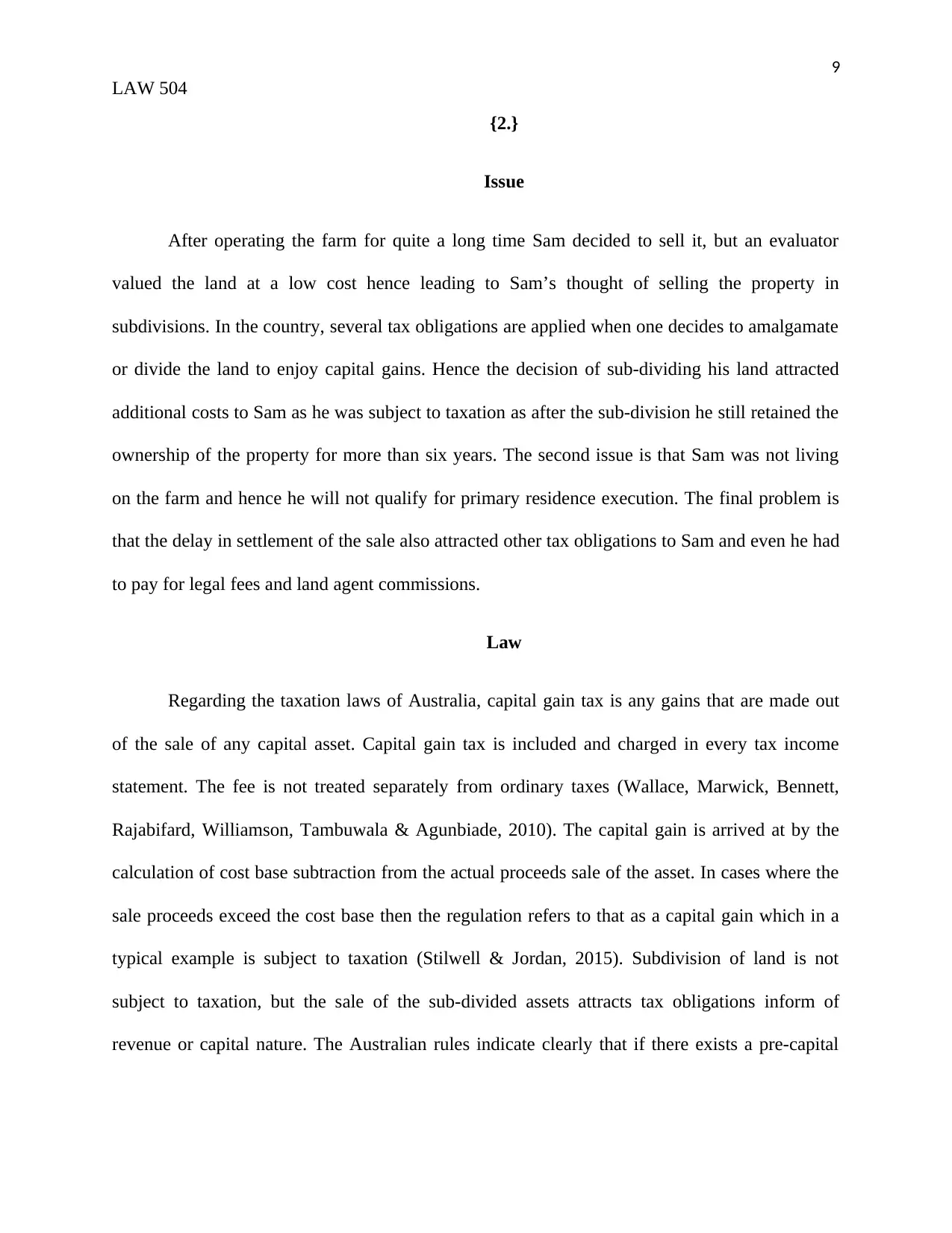
9
LAW 504
{2.}
Issue
After operating the farm for quite a long time Sam decided to sell it, but an evaluator
valued the land at a low cost hence leading to Sam’s thought of selling the property in
subdivisions. In the country, several tax obligations are applied when one decides to amalgamate
or divide the land to enjoy capital gains. Hence the decision of sub-dividing his land attracted
additional costs to Sam as he was subject to taxation as after the sub-division he still retained the
ownership of the property for more than six years. The second issue is that Sam was not living
on the farm and hence he will not qualify for primary residence execution. The final problem is
that the delay in settlement of the sale also attracted other tax obligations to Sam and even he had
to pay for legal fees and land agent commissions.
Law
Regarding the taxation laws of Australia, capital gain tax is any gains that are made out
of the sale of any capital asset. Capital gain tax is included and charged in every tax income
statement. The fee is not treated separately from ordinary taxes (Wallace, Marwick, Bennett,
Rajabifard, Williamson, Tambuwala & Agunbiade, 2010). The capital gain is arrived at by the
calculation of cost base subtraction from the actual proceeds sale of the asset. In cases where the
sale proceeds exceed the cost base then the regulation refers to that as a capital gain which in a
typical example is subject to taxation (Stilwell & Jordan, 2015). Subdivision of land is not
subject to taxation, but the sale of the sub-divided assets attracts tax obligations inform of
revenue or capital nature. The Australian rules indicate clearly that if there exists a pre-capital
LAW 504
{2.}
Issue
After operating the farm for quite a long time Sam decided to sell it, but an evaluator
valued the land at a low cost hence leading to Sam’s thought of selling the property in
subdivisions. In the country, several tax obligations are applied when one decides to amalgamate
or divide the land to enjoy capital gains. Hence the decision of sub-dividing his land attracted
additional costs to Sam as he was subject to taxation as after the sub-division he still retained the
ownership of the property for more than six years. The second issue is that Sam was not living
on the farm and hence he will not qualify for primary residence execution. The final problem is
that the delay in settlement of the sale also attracted other tax obligations to Sam and even he had
to pay for legal fees and land agent commissions.
Law
Regarding the taxation laws of Australia, capital gain tax is any gains that are made out
of the sale of any capital asset. Capital gain tax is included and charged in every tax income
statement. The fee is not treated separately from ordinary taxes (Wallace, Marwick, Bennett,
Rajabifard, Williamson, Tambuwala & Agunbiade, 2010). The capital gain is arrived at by the
calculation of cost base subtraction from the actual proceeds sale of the asset. In cases where the
sale proceeds exceed the cost base then the regulation refers to that as a capital gain which in a
typical example is subject to taxation (Stilwell & Jordan, 2015). Subdivision of land is not
subject to taxation, but the sale of the sub-divided assets attracts tax obligations inform of
revenue or capital nature. The Australian rules indicate clearly that if there exists a pre-capital
⊘ This is a preview!⊘
Do you want full access?
Subscribe today to unlock all pages.

Trusted by 1+ million students worldwide
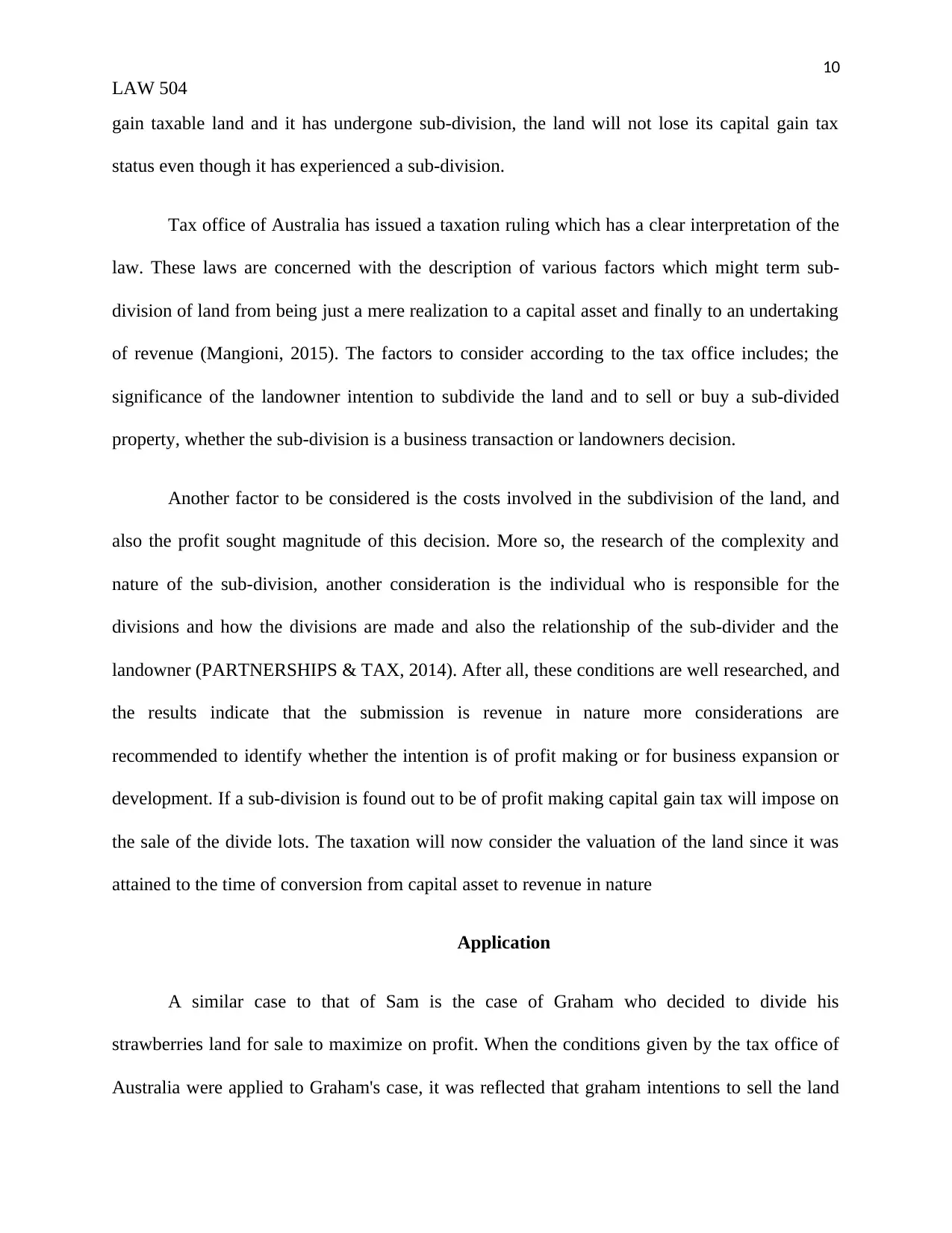
10
LAW 504
gain taxable land and it has undergone sub-division, the land will not lose its capital gain tax
status even though it has experienced a sub-division.
Tax office of Australia has issued a taxation ruling which has a clear interpretation of the
law. These laws are concerned with the description of various factors which might term sub-
division of land from being just a mere realization to a capital asset and finally to an undertaking
of revenue (Mangioni, 2015). The factors to consider according to the tax office includes; the
significance of the landowner intention to subdivide the land and to sell or buy a sub-divided
property, whether the sub-division is a business transaction or landowners decision.
Another factor to be considered is the costs involved in the subdivision of the land, and
also the profit sought magnitude of this decision. More so, the research of the complexity and
nature of the sub-division, another consideration is the individual who is responsible for the
divisions and how the divisions are made and also the relationship of the sub-divider and the
landowner (PARTNERSHIPS & TAX, 2014). After all, these conditions are well researched, and
the results indicate that the submission is revenue in nature more considerations are
recommended to identify whether the intention is of profit making or for business expansion or
development. If a sub-division is found out to be of profit making capital gain tax will impose on
the sale of the divide lots. The taxation will now consider the valuation of the land since it was
attained to the time of conversion from capital asset to revenue in nature
Application
A similar case to that of Sam is the case of Graham who decided to divide his
strawberries land for sale to maximize on profit. When the conditions given by the tax office of
Australia were applied to Graham's case, it was reflected that graham intentions to sell the land
LAW 504
gain taxable land and it has undergone sub-division, the land will not lose its capital gain tax
status even though it has experienced a sub-division.
Tax office of Australia has issued a taxation ruling which has a clear interpretation of the
law. These laws are concerned with the description of various factors which might term sub-
division of land from being just a mere realization to a capital asset and finally to an undertaking
of revenue (Mangioni, 2015). The factors to consider according to the tax office includes; the
significance of the landowner intention to subdivide the land and to sell or buy a sub-divided
property, whether the sub-division is a business transaction or landowners decision.
Another factor to be considered is the costs involved in the subdivision of the land, and
also the profit sought magnitude of this decision. More so, the research of the complexity and
nature of the sub-division, another consideration is the individual who is responsible for the
divisions and how the divisions are made and also the relationship of the sub-divider and the
landowner (PARTNERSHIPS & TAX, 2014). After all, these conditions are well researched, and
the results indicate that the submission is revenue in nature more considerations are
recommended to identify whether the intention is of profit making or for business expansion or
development. If a sub-division is found out to be of profit making capital gain tax will impose on
the sale of the divide lots. The taxation will now consider the valuation of the land since it was
attained to the time of conversion from capital asset to revenue in nature
Application
A similar case to that of Sam is the case of Graham who decided to divide his
strawberries land for sale to maximize on profit. When the conditions given by the tax office of
Australia were applied to Graham's case, it was reflected that graham intentions to sell the land
Paraphrase This Document
Need a fresh take? Get an instant paraphrase of this document with our AI Paraphraser
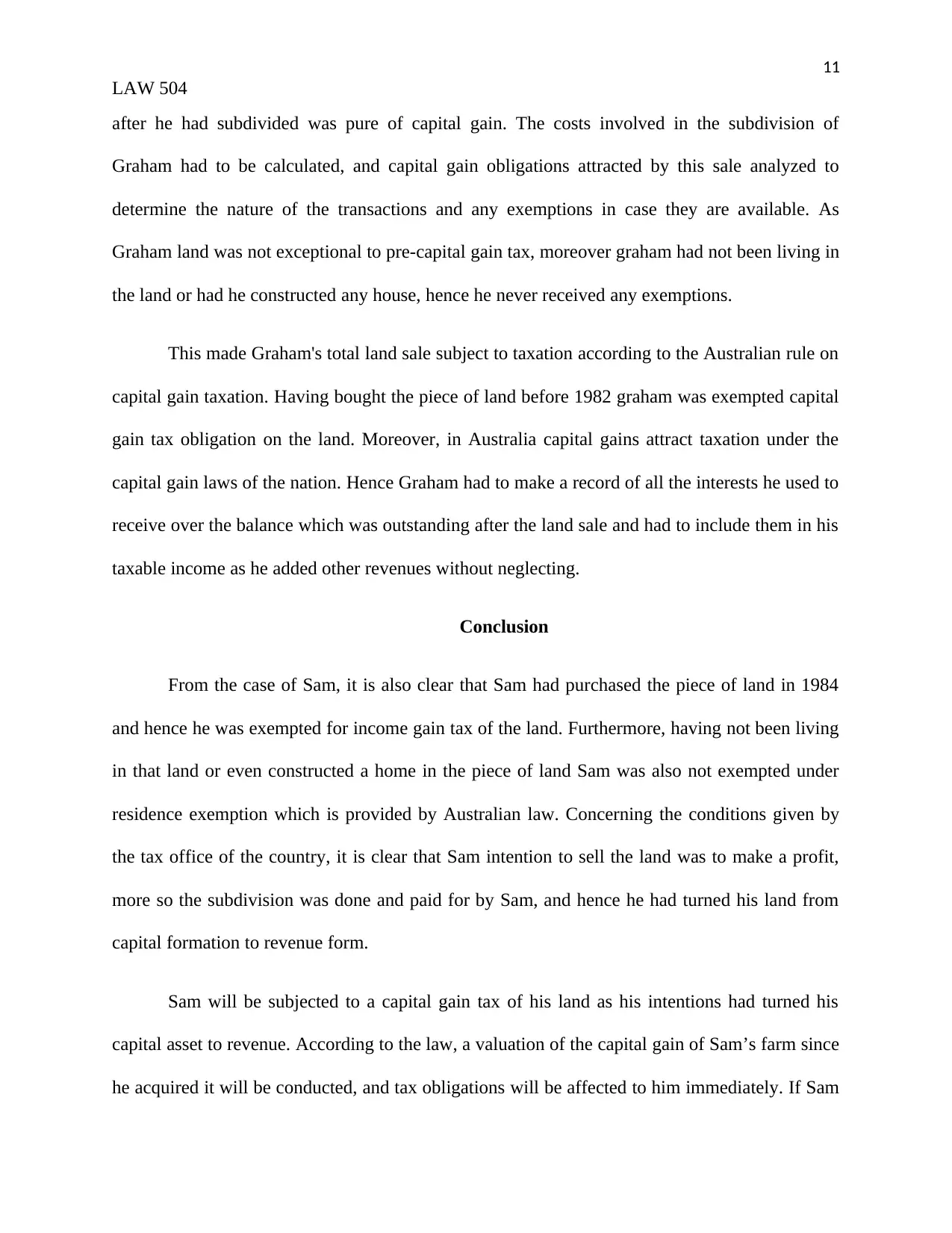
11
LAW 504
after he had subdivided was pure of capital gain. The costs involved in the subdivision of
Graham had to be calculated, and capital gain obligations attracted by this sale analyzed to
determine the nature of the transactions and any exemptions in case they are available. As
Graham land was not exceptional to pre-capital gain tax, moreover graham had not been living in
the land or had he constructed any house, hence he never received any exemptions.
This made Graham's total land sale subject to taxation according to the Australian rule on
capital gain taxation. Having bought the piece of land before 1982 graham was exempted capital
gain tax obligation on the land. Moreover, in Australia capital gains attract taxation under the
capital gain laws of the nation. Hence Graham had to make a record of all the interests he used to
receive over the balance which was outstanding after the land sale and had to include them in his
taxable income as he added other revenues without neglecting.
Conclusion
From the case of Sam, it is also clear that Sam had purchased the piece of land in 1984
and hence he was exempted for income gain tax of the land. Furthermore, having not been living
in that land or even constructed a home in the piece of land Sam was also not exempted under
residence exemption which is provided by Australian law. Concerning the conditions given by
the tax office of the country, it is clear that Sam intention to sell the land was to make a profit,
more so the subdivision was done and paid for by Sam, and hence he had turned his land from
capital formation to revenue form.
Sam will be subjected to a capital gain tax of his land as his intentions had turned his
capital asset to revenue. According to the law, a valuation of the capital gain of Sam’s farm since
he acquired it will be conducted, and tax obligations will be affected to him immediately. If Sam
LAW 504
after he had subdivided was pure of capital gain. The costs involved in the subdivision of
Graham had to be calculated, and capital gain obligations attracted by this sale analyzed to
determine the nature of the transactions and any exemptions in case they are available. As
Graham land was not exceptional to pre-capital gain tax, moreover graham had not been living in
the land or had he constructed any house, hence he never received any exemptions.
This made Graham's total land sale subject to taxation according to the Australian rule on
capital gain taxation. Having bought the piece of land before 1982 graham was exempted capital
gain tax obligation on the land. Moreover, in Australia capital gains attract taxation under the
capital gain laws of the nation. Hence Graham had to make a record of all the interests he used to
receive over the balance which was outstanding after the land sale and had to include them in his
taxable income as he added other revenues without neglecting.
Conclusion
From the case of Sam, it is also clear that Sam had purchased the piece of land in 1984
and hence he was exempted for income gain tax of the land. Furthermore, having not been living
in that land or even constructed a home in the piece of land Sam was also not exempted under
residence exemption which is provided by Australian law. Concerning the conditions given by
the tax office of the country, it is clear that Sam intention to sell the land was to make a profit,
more so the subdivision was done and paid for by Sam, and hence he had turned his land from
capital formation to revenue form.
Sam will be subjected to a capital gain tax of his land as his intentions had turned his
capital asset to revenue. According to the law, a valuation of the capital gain of Sam’s farm since
he acquired it will be conducted, and tax obligations will be affected to him immediately. If Sam
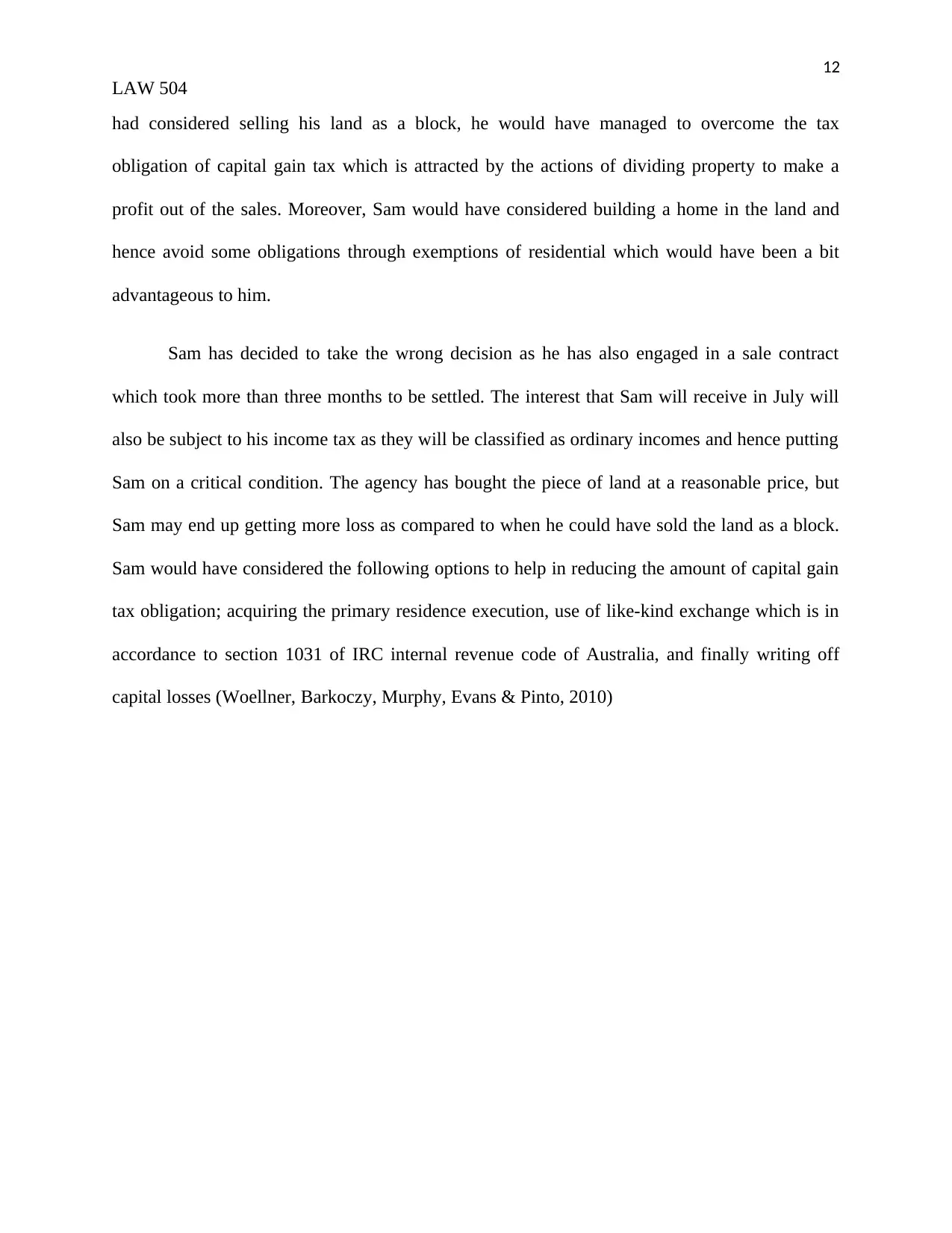
12
LAW 504
had considered selling his land as a block, he would have managed to overcome the tax
obligation of capital gain tax which is attracted by the actions of dividing property to make a
profit out of the sales. Moreover, Sam would have considered building a home in the land and
hence avoid some obligations through exemptions of residential which would have been a bit
advantageous to him.
Sam has decided to take the wrong decision as he has also engaged in a sale contract
which took more than three months to be settled. The interest that Sam will receive in July will
also be subject to his income tax as they will be classified as ordinary incomes and hence putting
Sam on a critical condition. The agency has bought the piece of land at a reasonable price, but
Sam may end up getting more loss as compared to when he could have sold the land as a block.
Sam would have considered the following options to help in reducing the amount of capital gain
tax obligation; acquiring the primary residence execution, use of like-kind exchange which is in
accordance to section 1031 of IRC internal revenue code of Australia, and finally writing off
capital losses (Woellner, Barkoczy, Murphy, Evans & Pinto, 2010)
LAW 504
had considered selling his land as a block, he would have managed to overcome the tax
obligation of capital gain tax which is attracted by the actions of dividing property to make a
profit out of the sales. Moreover, Sam would have considered building a home in the land and
hence avoid some obligations through exemptions of residential which would have been a bit
advantageous to him.
Sam has decided to take the wrong decision as he has also engaged in a sale contract
which took more than three months to be settled. The interest that Sam will receive in July will
also be subject to his income tax as they will be classified as ordinary incomes and hence putting
Sam on a critical condition. The agency has bought the piece of land at a reasonable price, but
Sam may end up getting more loss as compared to when he could have sold the land as a block.
Sam would have considered the following options to help in reducing the amount of capital gain
tax obligation; acquiring the primary residence execution, use of like-kind exchange which is in
accordance to section 1031 of IRC internal revenue code of Australia, and finally writing off
capital losses (Woellner, Barkoczy, Murphy, Evans & Pinto, 2010)
⊘ This is a preview!⊘
Do you want full access?
Subscribe today to unlock all pages.

Trusted by 1+ million students worldwide
1 out of 14
Related Documents
Your All-in-One AI-Powered Toolkit for Academic Success.
+13062052269
info@desklib.com
Available 24*7 on WhatsApp / Email
![[object Object]](/_next/static/media/star-bottom.7253800d.svg)
Unlock your academic potential
Copyright © 2020–2026 A2Z Services. All Rights Reserved. Developed and managed by ZUCOL.





